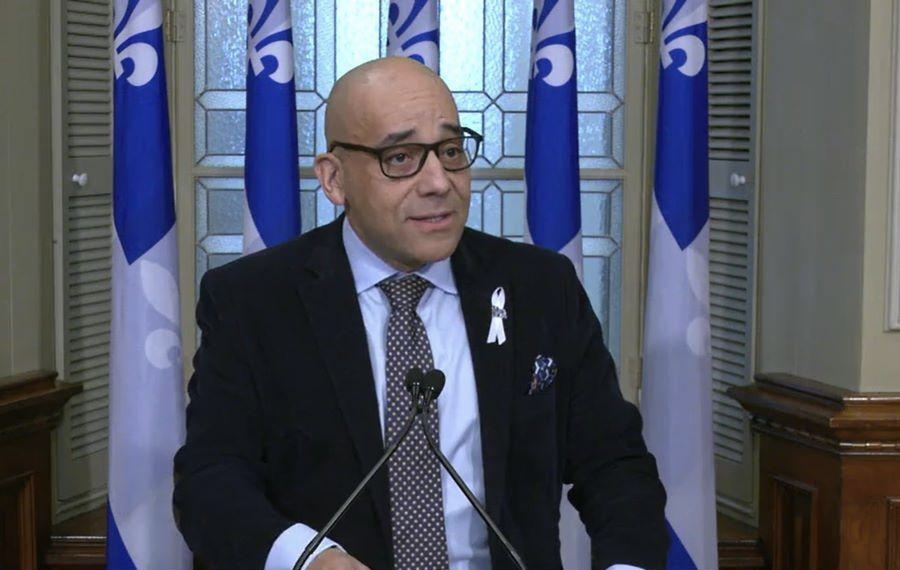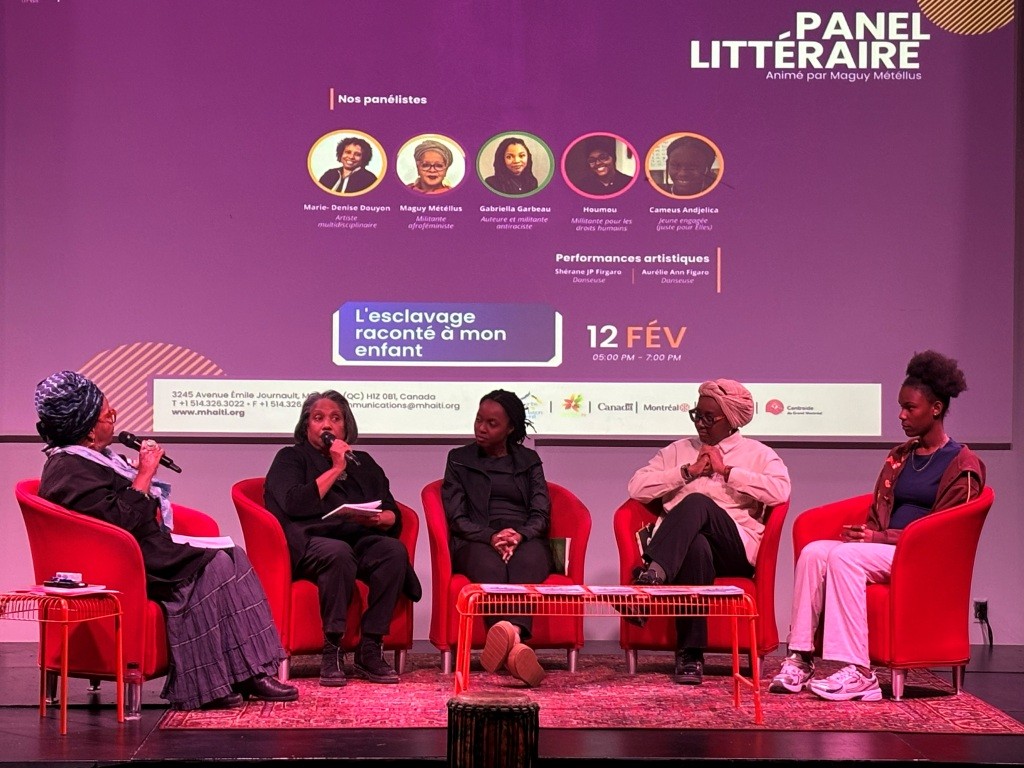Editor’s note: This story was originally published in French. An earlier version of this article in English included errors in translation. These have now been revised for clarity and accuracy.
With over 700 years of history and deep roots in traditional Sufi practices, qawwali music is experiencing a renaissance among desi* youth, thanks to genre-blending hits that speak to both heritage and modern sensibilities. Here’s a closer look at this phenomenon.
On a cold Saturday night in February, about 60 young people of South Asian origin, spanning from diasporas across the Indian subcontinent gather at Plaza Centre-Ville in Evo Montreal for an evening of qawwali. They settle onto thin white mats spread across the floor, preparing to listen to Masroor Fateh Ali Khan, a disciple of the legendary Nusrat Fateh Ali Khan, the internationally celebrated qawwali master who passed away in 1997.
A gentle red heat permeates the room. Multicolored lights ripple across the walls. From the stage, a blend of harmonium, tabla, electric guitar, and keyboard reverberates, overlaid with the soaring melodic calls of the qawwal**. Hands begin to clap in rhythm, bodies sway, and the room joins in on a chorus of call and response.
Organized by McGill University’s Pakistani Students Association (PSA), the “Qawwali Night” event showcases this devotional musical form popular in India, Pakistan, and Bangladesh. Qawwali, a form of sung poetry that dates back to 13th-century Sufi communities, explores universal themes like love, devotion, and a deep yearning for the divine. Traditionally performed in shrines, rituals, and festivals honoring Sufi saints across regions of Punjab and Sindh (present-day India and Pakistan), these gatherings often lasted hours, with practitioners guiding participants into trance-like states to evoke spiritual experiences.
Seven centuries later, this mystical practice is finding a new voice among South Asian diasporas, in Montreal and other big cities across Canada. Over the past four years, qawwali events have been organized by student groups and arts organizations like the Kabir Centre.
That night, the Plaza Centre-Ville resonated with powerful voices, traditional instruments, and intricate musical arrangements that collided to create an atmosphere of spiritual ecstasy in the room. The crowd’s faces reflect the stirring emotions of the moment.
Malik Tahir, a Pakistani who regularly attends qawwali performances, is dressed to the nines for the occasion. Donning a black tuxedo, he shares his excitement: “Qawwali is one of my favorite events. It’s such a unique experience,” he says. “Love, faith, nature, the universe—they’re described in such different ways. The same line can sound sad if you’re sad, and happy if you’re happy. It’s very deep,” he concludes, visibly moved. “It’s transcendental; it reminds you of your humanity, and that’s so important for our connection as a community.”
Outside the main performance hall, the space is bright and airy. People mingle enthusiastically. Tables are carefully laid with plates of biryani, chicken noodles, spring rolls, and a chai tea dispenser.

Photo credit: Aminah Hannan
Labiba Malik, a young attendee of Bangladeshi origin, reflects on the evening. “The voices of these ustads*** are so powerful, they come from deep within. The lyrics describe emotions really well. This is nostalgic for me: when I was younger, I used to listen to a lot of qawwali.” Though she has attended many performances in Bangladesh, this is her first in Montreal. “Now that I’ve grown up, with life and time passing, I really see myself in the lyrics. You don’t need to have experienced great pain or heartbreak to feel touched.”
A fresh current of connections
Although it has ancient roots, qawwali is evolving and adapting to modern musical sensibilities. The introduction of electronic instruments and genre-blending arrangements have helped shape a more contemporary sound, giving the tradition renewed relevance for today’s audiences.
Coke Studio, a hugely popular Pakistani music series in the Indian subcontinent, has also revived interest in traditional music among desis and helped introduce this musical heritage beyond South Asia. The show has become a true cultural phenomenon online, platforming performances that blend traditional and modern music, including qawwali with rock, pop, and electronica.

Photo credit: Aminah Hannan
Qawwali’s ability to spark new connections and transcend cultural, religious, and generational barriers is one of the core elements of its appeal and resurgence among youth in the diaspora.
“What I’ve noticed is that people come together around qawwali,” says Salma Sikdar, another Bangladeshi student attending her first performance. She expresses a wish to reconnect with her roots and experience something new. “Even if there are people who have very picky music tastes, qawwali leaves a mark. When the music starts, everyone sings together, and personal differences fade.”
Labiba Malik echoes her friend’s opinion. “It’s unconscious. Your hands just start moving, and you go: ‘Wah, wah!’****” she proclaims enthusiastically.
For Malik, the strength of this shared musical tradition also lies in its ability to create bridges between generations. “Sometimes we’re sitting in the car with our parents, and when the music kicks in, everyone gets carried away. We’ll tap to the beat on whatever we have in front of us—the dashboard becomes our harmonium; it’s a collective experience. Whether young or old, qawwali makes everyone feel at home,” she states.
“These things used to be reserved for our fathers and uncles, and we would listen from another room,” Malik adds, explaining that in the past, qawwali was largely considered music for older men: “Now, we’re all part of it.”
Today, qawwali has also found an audience with non-Muslim desis. Its popularity means it is played at weddings, festivals, and concerts in Canada and beyond.
Nida Patel, a young Indian woman, is attending her first qawwali concert during La Converse’s visit. “It’s really interesting for me to discover—or rediscover—these songs today through these interpretations. It’s a shared heritage we have as South Asians,” she tells us.
Embracing simplicity, evoking feeling

Photo credit: Aminah Hannan
In a corner of the room, the qawwal Masroor Fateh Ali Khan is seated on a large white armchair. The evening’s performer—known for his songs Sun Saiyan and Mahiya Vey—welcomes us with the kindness of an uncle. Smiling, he explains that qawwali is a divine tool for strengthening communities.
“Qawwali is a link between souls. It connects people’s rooh**** through purity of feeling, and passes on spiritual and devotional teachings,” he says thoughtfully. He gestures his hands gently as he speaks: “Creating new compositions and melodies helps us resonate with new audiences, but the goal remains the same: to create devotional music.”
Khan’s song La Makani notably references a poem by Baba Bulleh Shah, the 18th-century Punjabi Sufi philosopher known to older generations. The lyrics reflect the beauty and omnipresence of the divine in all human beings:
Kinnoo la makani das day ho
Tussi har rang day vich wasday ho
Pucho aadam kisnay aanda hai
Kithon aa ya hai kithe janda hai
Authey kis da tennu lanjha hai
Authey kha dana uth nasde ho
Bulleh Shah anayat araf hai
Jhera mere dhil da waris hai
Main loya te o paras hai
Jide nal tussi ghasde ho.
The one you call without a dwelling (God)
Exists in all colors, in all places.
Ask mankind: where do they come from, and where are they going?
Who gives them direction?
Who provides the grains they eat?
Bulleh Shah is a recipient of Grace.
[God] is the guardian of his heart.
I am iron and [He] is the touchstone
With which we are shaped.
“The sincerity of the feelings [in these songs] is why qawwali still touches people and transcends generations and communities today,” the qawwal adds. After performing in India, Pakistan, and Canada, he is now preparing to tour in the United Kingdom.
Further Listening
For those wishing to discover traditional qawwali, Masroor Fateh Ali Khan recommends the devotional works of his mentor, Nusrat Fateh Ali Khan: Allah Hu, Mast Nazron Se Allah Bachaye, and Kali Kali Zulfon Ke.
For more contemporary selections, attendees from the evening suggest Tu Jhoom by Abida Parveen and Naseebo Lal.

Photo credit: Aminah Hannan
* desi: A term used to describe the peoples, cultures, and products of the Indian subcontinent and its diasporas. Derived from the Sanskrit word meaning “land” or “country.”
** qawwal: A performer of qawwali music.
*** ustad: An honorific title used to refer to a recognized master or expert of qawwali.
**** “Wah, wah!”: A shortened form of the Urdu and Hindi expression “Wah, kya baat hai!”, used to express enthusiasm or admiration for something beautiful. Commonly heard during performances.
***** rooh: An Arabic word used in Muslim and Sufi communities to describe the divine spirit or life force within a person. It often refers to the “true self,” or the immaterial and immortal soul of a living being.






